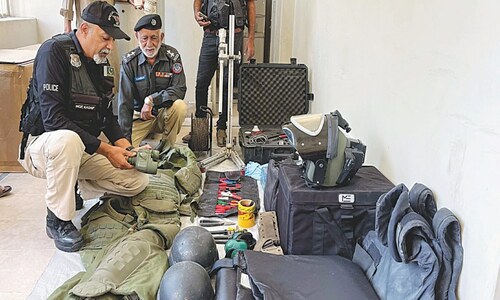
“SOME books are undeservedly forgotten; none are undeservedly remembered,” said W. H. Auden.
Urdu Mein Lok Adab, or folk literature in Urdu, is a book that was first published in 1990 from Delhi and was forgotten undeservedly. Now it has been reprinted from Karachi — deservingly so — and it deserves to be reread and remembered.
Folk literature has usually been ignored, even looked down upon, not only in our part of the world, but it was pooh-poohed in the West as well until about a couple of centuries ago. Though generally treated contemptuously, even by apparently sensible people, folk literature of any language is a virtual treasure trove of information on the history and culture of the people who speak that language. It reflects traditional knowledge and wisdom handed down through centuries as well as beliefs and cultural and social values held dear by the people who speak a specific language or dialect. Folk literature is a very important source of linguistic research and can help trace the historical, etymological and semantic roots of the vocabulary of a language.
One of the reasons many people consider folk literature inferior is that folk literature’s origin is rustic. Often it is simple, is created by people who are mostly unlettered and live in the countryside. Its oral origin is also responsible for the stigma attached to it. But, interestingly, until 4000 BC, when the writing systems were developed, there was nothing other than an oral literary tradition.
‘Folk’ literally means ‘people’ and folk literature is created by people, as its creator, in many cases, is unknown. It is the body of myths, tales, poems, songs, lullabies, jokes, proverbs and riddles transmitted orally from generation to generation over the centuries. As for Pakistani languages, much has been written on their folk literatures and it is nice to note that every year new books arrive on the topic. Some organisations, such as Lok Varsa, have done a commendable job by publishing translations from Pakistani languages into Urdu and research works capturing the literary essence of these languages, albeit most of old books on the topic are now out of print.
But when it comes to Urdu’s folk literature, alas, even some scholars show insulting behaviour towards folk literature in general and Urdu’s folk literature in particular. Some people think Urdu does not have any folk literature at all, says Prof Qamar Raees, the compiler of the book, in his intro.
Prof Raees has described how a writer of Hindi had objected to giving the status of a distinct language to Urdu in India on the pretext that Urdu was the language of urban aristocracy and did not have any folk literature. This, as put by the Hindi writer, was tantamount to not having any roots in the common people and, therefore, Urdu was not a separate language. This misconception, explains Prof Raees, is the result of the notion that folk literatures of regions where both Urdu and Hindi are spoken, especially in the Northern India, are the folk literatures of Hindi alone, but in fact the larger part of the folk songs, lullabies, tales and proverbs are the folk heritage shared commonly by both Urdu and Hindi.
Be it wedding songs or lullabies, be it riddles or songs sung during ‘saavan’ (the rainy season), these are very much part of Urdu’s folk literature. Muhammad Hussain Azad has quoted in his Aab-i-Hayat some simple songs attributed to Ameer Khusrau. The problem, laments Prof Raees, is that our younger researchers are badly “affected by pretentious research” on classics and prefer editing the old, classical manuscripts rather than folk literature. Their scorn for folk literature has caused great damage to Urdu literature, adds Prof Raees.
The book is a collection of 22 articles written by renowned scholars such as Prof Masood Hussain Khan, Prof Muhammad Hasan, Tanveer Ahmed Alavi, Rasheed Hasan Khan, Maimoona Dalvi, Yousuf Sarmast, Ali Jawad Zaidi, Ali Ahmed Fatemi, Younus Ugaskar and some others.
Masood Hussain Khan, being a linguist, in his article ‘Urdu Ke Awami Rishte’ (Urdu’s folk connections) has succinctly captured the essence of the debate that begins raging whenever the question of Hindi and Urdu is raised: every language, be it English or French, or Urdu for that matter, has some dialects at its base from which it gets lifeblood. The dialects spoken in and around Delhi centuries ago included Haryanvi, Khari Boli, Brij Bhasha and Mevati and served as base for Hindi as well as Urdu. The folk literature found in these dialects, thus, is a common heritage shared by both Urdu and Hindi because these two sister languages have essentially developed from the common roots originating from Prakrit and Sanskrit.
As put by Prof Khan, Urdu has its roots in rural areas though it got refined in urban areas. So Urdu is not deprived of folk literature.
Published in Dawn, March 15th, 2021













































Dear visitor, the comments section is undergoing an overhaul and will return soon.